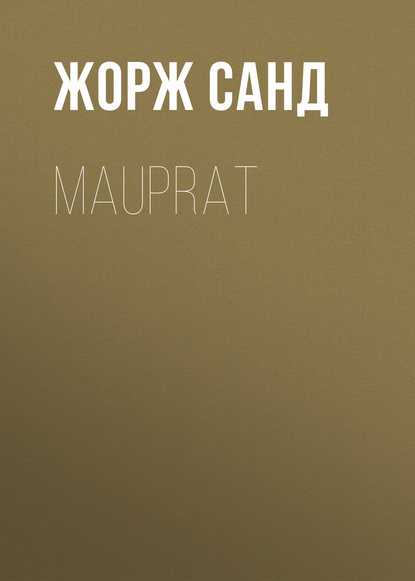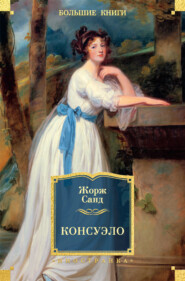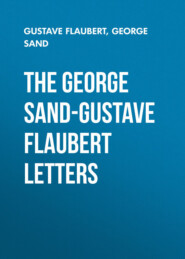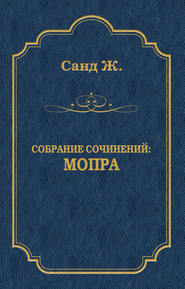По всем вопросам обращайтесь на: info@litportal.ru
(©) 2003-2025.
✖
Mauprat
Настройки чтения
Размер шрифта
Высота строк
Поля
“And you, Bernard,” said Edmee, “will you give me your word of honour to wait for me here?”
“I can’t say,” I answered; “that will depend on the length of your absence and on my patience; but you know quite well, cousin, that we shall meet again, even if it be in hell; and for my part, the sooner the better.”
By the light of the brand which Patience was holding to examine the horse’s harness, I saw her beautiful face flush and then turn pale. Then she raised her eyes which had been lowered in sorrow, and looked at me fixedly with a strange expression.
“Are we ready to start?” said Marcasse, opening the door.
“Yes, forward,” said Patience, taking the bridle. “Edmee, my child, take care to bend down while passing under the door.”
“What is the matter, Blaireau?” said Marcasse, stopping on the threshold and thrusting out the point of his sword, gloriously rusted by the blood of the rodent tribe.
Blaireau did not stir, and if he had not been born dumb, as his master said, he would have barked. But he gave warning as usual by a sort of dry cough. This was his most emphatic sign of anger and uneasiness.
“There must be something down there,” said Marcasse; and he boldly advanced into the darkness, after making a sign to the rider not to follow. The report of firearms made us all start. Edmee jumped down lightly from her horse, and I did not fail to notice that some impulse at once prompted her to come and stand behind my chair. Patience rushed out of the tower. The cure ran to the frightened horse, which was rearing and backing toward us. Blaireau managed to bark. I forgot my sprain, and in a single bound I was outside.
A man covered with wounds, and with the blood streaming from him, was lying across the doorway. It was my Uncle Laurence. He had been mortally wounded at the siege of Roche-Mauprat, and had come to die under our eyes. With him was his brother Leonard, who had just fired his last pistol shot at random, luckily without hitting any one. Patience’s first impulse was to prepare to defend himself. On recognising Marcasse, however, the fugitives, far from showing themselves hostile, asked for shelter and help. As their situation was so desperate no one thought that assistance should be refused. The police were pursuing them. Roche-Mauprat was in flames; Louis and Peter had died fighting; Antony, John, and Walter had fled in another direction, and, perhaps, were already prisoners. No words would paint the horror of Laurence’s last moments. His agony was brief but terrible. His blasphemy made the cure turn pale. Scarce had the door been shut and the dying man laid on the floor than the horrible death-rattle was heard. Leonard, who knew of no remedy but brandy, snatched Marcasse’s flask out of my hand (not without swearing and scornfully reproaching me for my flight), forced open his brother’s clinched teeth with the blade of his hunting-knife, and, in spite of our warning, poured half the flask down his throat. The wretched man bounded into the air, brandished his arms in desperate convulsions, drew himself up to his full height, and fell back stone dead upon the blood-stained floor. There was no time to offer up a prayer over the body, for the door resounded under the furious blows of our assailants.
“Open in the King’s name!” cried several voices; “open to the police!”
“Help! help!” cried Leonard, seizing his knife and rushing towards the door. “Peasants, prove yourselves nobles! And you, Bernard, atone for your fault; wash out your shame; do not let a Mauprat fall into the hands of the gendarmes alive!”
Urged on by native courage and by pride, I was about to follow his example, when Patience rushed at him, and exerting his herculean strength, threw him to the ground. Putting one knee on his chest, he called to Marcasse to open the door. This was done before I could take my uncle’s part against his terrible assailant. Six gendarmes at once rushed into the tower and, with their guns pointed, bade us move at our peril.
“Stay, gentlemen,” said Patience, “don’t harm any one. This is your prisoner. Had I been alone with him, I should either have defended him or helped him to escape; but there are honest people here who ought not to suffer for a knave; and I did not wish to expose them to a fight. Here is the Mauprat. Your duty, as you know, is to deliver him safe and sound into the hands of justice. This other is dead.”
“Monsieur, surrender!” said the sergeant of the gendarmes, laying his hand on Leonard.
“Never shall a Mauprat drag his name into the dock of a police court,” replied Leonard, with a sullen expression. “I surrender, but you will get nothing but my skin.”
And he allowed himself to be placed in a chair without making any resistance.
But while they were preparing to bind him he said to the cure:
“Do me one last kindness, Father. Give me what is left in the flask; I am dying of thirst and exhaustion.”
The good cure handed him the flask, which he emptied at a draught. His distorted face took on an expression of awful calm. He seemed absorbed, stunned, incapable of resistance. But as soon as they were engaged in binding his feet, he snatched a pistol from the belt of one of the gendarmes and blew his brains out.
This frightful spectacle completely unnerved me. Sunk in a dull stupor, no longer conscious of what was happening around me, I stood there as if turned to stone, and it was only after some minutes that I realized that I was the subject of a serious discussion between the police and my hosts. One of the gendarmes declared that he recognised me as a Hamstringer Mauprat. Patience declared that I was nothing but M. Hubert de Mauprat’s gamekeeper, in charge of his daughter. Annoyed at the discussion, I was about to make myself known when I saw a ghost rise by my side. It was Edmee. She had taken refuge between the wall and the cure’s poor frightened horse, which, with outstretched legs and eyes of fire, made her a sort of rampart with its body. She was as pale as death, and her lips were so compressed with horror that at first, in spite of desperate efforts to speak, she was unable to express herself otherwise than by signs. The sergeant, moved by her youth and her painful situation, waited with deference until she could manage to make herself understood. At last she persuaded them not to treat me as a prisoner, but to take me with her to her father’s chateau, where she gave her word of honour that satisfactory explanations and guarantees would be furnished on my account. The cure and the other witnesses, having pledged their words to this, we set out all together, Edmee on the sergeant’s horse, he on an animal belonging to one of his men, myself on the cure’s, Patience and the cure afoot between us, the police on either side, and Marcasse in front, still impassive amid the general terror and consternation. Two of the gendarmes remained behind to guard the bodies and prepare a report.
VIII
We had travelled about a league through the woods. Wherever other paths had crossed our own, we had stopped to call aloud; for Edmee, convinced that her father would not return home without finding her, had implored her companions to help her to rejoin him. To this shouting the gendarmes had been very averse, as they were afraid of being discovered and attacked by bodies of the fugitives from Roche-Mauprat. On our way they informed us that this den had been captured at the third assault. Until then the assailants had husbanded their forces. The officer in command of the gendarmes was anxious to get possession of the keep without destroying it; and, above all, to take the defenders alive. This, however, was impossible on account of the desperate resistance they made. The besiegers suffered so severely in their second attempt that they found themselves compelled to adopt extreme measures or to retreat. They therefore set the outer buildings on fire, and in the ensuing assault put forth all their strength. Two Mauprats were killed while fighting on the ruins of their bastion; the other five disappeared. Six men were dispatched in pursuit of them in one direction, six in another. Traces of the fugitives had been discovered immediately, and the men who gave us these details had followed Laurence and Leonard so closely that several of their shots had hit the former only a short distance from Gazeau Tower. They had heard him cry that he was done for; and, as far as they could see, Leonard had carried him to the sorcerer’s door. This Leonard was the only one of my uncles who deserved any pity, for he was the only one who might, perhaps, have been encouraged to a better kind of life. At times there was a touch of chivalry in his brigandage, and his savage heart was capable of affection. I was deeply moved, therefore, by his tragic death, and let myself be carried along mechanically, plunged in gloomy thoughts, and determined to end my days in the same manner should I ever be condemned to the disgrace he had scorned to endure.
All at once the sound of horns and the baying of hounds announced the approach of a party of huntsmen. While we, on our side, were answering with shouts, Patience ran to meet them. Edmee, longing to see her father again, and forgetting all the horrors of this bloody night, whipped up her horse and reached the hunters first. As soon as we came up with them, I saw Edmee in the arms of a tall man with a venerable face. He was richly dressed; his hunting-coat, with gold lace over all the seams, and the magnificent Norman horse, which a groom was holding behind him, so struck me that I thought I was in the presence of a prince. The signs of love which he was showing his daughter were so new to me that I was inclined to deem them exaggerated and unworthy of the dignity of a man. At the same time they filled me with a sort of brute jealousy; for it did not occur to my mind that a man so splendidly dressed could be my uncle. Edmee was speaking to him in a low voice, but with great animation. Their conversation lasted a few moments. At the end of it the old man came and embraced me cordially. Everything about these manners seemed so new to me, that I responded neither by word nor gesture to the protestations and caresses of which I was the object. A tall young man, with a handsome face, as elegantly dressed as M. Hubert, also came and shook my hand and proffered thanks; why, I could not understand. He next entered into a discussion with the gendarmes, and I gathered that he was the lieutenant-general of the province, and that he was ordering them to set me at liberty for the present, that I might accompany my uncle to his chateau, where he undertook to be responsible for me. The gendarmes then left us, for the chevalier and the lieutenant-general were sufficiently well escorted by their own men not to fear attack from any one. A fresh cause of astonishment for me was to see the chevalier bestowing marks of warm friendship on Patience and Marcasse. As for the cure, he was upon a footing of equality with these seigneurs. For some months he had been chaplain at the chateau of Saint-Severe, having previously been compelled to give up his living by the persecutions of the diocesan clergy.
All this tenderness of which Edmee was the object, this family affection so completely new to me, the genuinely cordial relations existing between respectful plebeians and kindly patricians – everything that I now saw and heard seemed like a dream. I looked on with a sensation that it was all unintelligible to me. However, soon after our caravan started my brain began to work; for I then saw the lieutenant-general (M. de la Marche) thrust his horse between Edmee’s and my own, as if he had a right to be next to her. I remembered her telling me at Roche-Mauprat that he was her betrothed. Hatred and anger at once surged up within me, and I know not what absurdity I should have committed, had not Edmee, apparently divining the workings of my unruly soul, told him that she wanted to speak to me, and thus restored me to my place by her side.
“What have you to say to me?” I asked with more eagerness than politeness.
“Nothing,” she answered in an undertone. “I shall have much to say later. Until then will you do everything I ask of you?”
“And why the devil should I do everything you ask of me, cousin?”
For a moment she hesitated to reply; then, making an effort, she said:
“Because it is thus that a man proves to a woman that he loves her.”
“Do you believe that I don’t love you?” I replied abruptly.
“How should I know?” she said.
This doubt astonished me very much, and I tried to combat it after my fashion.
“Are you not beautiful?” I said; “and am not I a young man? Perhaps you think I am too much of a boy to notice a woman’s beauty; but now that my head is calm, and I am sad and quite serious, I can assure you that I am even more deeply in love with you than I thought. The more I look at you the more beautiful you seem. I did not think that a woman could be so lovely. I tell you I shall not sleep till.”
“Hold your tongue,” she said sharply.
“Oh, I suppose you are afraid that man will hear me,” I answered, pointing to M. de la Marche. “Have no fear; I know how to keep my word; and, as you are the daughter of a noble house, I hope you know how to keep yours.”
She did not reply. We had reached a part of the road where it was only possible for two to walk abreast. The darkness was profound, and although the chevalier and the lieutenant-general were at our heels, I was going to make bold to put my arm round her waist, when she said to me, in a sad and weary voice:
“Cousin, forgive me for not talking to you. I’m afraid I did not quite understand what you said. I am so exhausted that I feel as if I were going to die. Luckily, we have reached home now. Promise me that you will love my father, that you will yield to all his wishes, that you will decide nothing without consulting me. Promise me this if you would have me believe in your friendship.”
“Oh, my friendship? you are welcome not to believe in that,” I answered; “but you must believe in my love. I promise everything you wish. And you, will you not promise me anything? Do, now, with a good grace.”
“What can I promise that is not yours?” she said in a serious tone. “You saved my honour; my life belongs to you.”
The first glimmerings of dawn were now beginning to light the horizon. We had reached the village of Saint-Severe, and soon afterward we entered the courtyard of the chateau. On dismounting from her horse Edmee fell into her father’s arms; she was as pale as death. M. de la Marche uttered a cry, and helped to carry her away. She had fainted. The cure took charge of me. I was very uneasy about my fate. The natural distrust of the brigand sprang up again as soon as I ceased to be under the spell of her who had managed to lure me from my den. I was like a wounded wolf; I cast sullen glances about me, ready to rush at the first being who should stir my suspicions by a doubtful word or deed. I was taken into a splendid room, and a meal, prepared with a luxury far beyond anything I could have conceived, was immediately served. The cure displayed the kindest interest in me; and, having succeeded in reassuring me a little, he went to attend to his friend Patience. The disturbed state of my mind and my remnant of uneasiness were not proof against the generous appetite of youth. Had it not been for the respectful assiduity of a valet much better dressed than myself, who stood behind my chair, and whose politeness I could not help returning whenever he hastened to anticipate my wants, I should have made a terrific breakfast; as it was, the green coat and silk breeches embarrassed me considerably. It was much worse when, going down on his knees, he set about taking off my boots preparatory to putting me to bed. For the moment I thought he was playing a trick upon me, and came very near giving him a good blow on the head; but his manner was so serious as he went through this task that I sat and stared at him in amazement.
At first, at finding myself in bed without arms, and with people entering and leaving my room always on tip-toe, I again began to feel suspicious. I took advantage of a moment when I was alone to get out of bed and take from the table, which was only half cleared, the longest knife I could find. Feeling easier in my mind, I returned to bed and fell into a sound sleep, with the knife firmly clasped in my hand.
When I awoke again the rays of the setting sun, softened by my red damask curtains, were falling on my beautifully fine sheets and lighting up the golden pomegranates that adorned the corners of the bed. This bed was so handsome and soft that I felt inclined to make it my apologies for having slept in it. As I was about to get up I saw a kindly, venerable face looking through the half-drawn curtains and smiling. It was the Chevalier Hubert de Mauprat. He inquired anxiously about the state of my health. I endeavoured to be polite and to express my gratitude; but the language I used seemed so different from his that I was disconcerted and pained at my awkwardness without being able to realize why. To crown my misery, a movement that I made caused the knife which I had taken as bedfellow to fall at M. de Mauprat’s feet. He picked it up, looked at it, and then at myself with extreme surprise. I turned as red as fire and stammered out I know not what. I expected he would reprove me for this insult to his hospitality. However, he was too polite to insist upon a more complete explanation. He quietly placed the knife on the mantel-piece and, returning to me, spoke as follows:
“Bernard, I now know that I owe to you the life that I hold dearest in the world. All my own life shall be devoted to giving you proofs of my gratitude and esteem. My daughter also is sacredly indebted to you. You need, then, have no anxiety about your future. I know what persecution and vengeance you exposed yourself to in coming to us; but I know, too, from what a frightful existence my friendship and devotion will be able to deliver you. You are an orphan, and I have no son. Will you have me for your father?”
I stared at the chevalier with wild eyes. I could not believe my ears. All feeling within me seemed paralyzed by astonishment and timidity. I was unable to answer a word. The chevalier himself evidently felt some astonishment; he had not expected to find a nature so brutishly ill-conditioned.
“Come,” he said; “I hope that you will grow accustomed to us. At all events, shake hands, to show that you trust me. I will send up your servant; give him your orders; he is at your disposal. I have only one promise to exact from you, and that is that you will not go beyond the walls of the park until I have taken steps to make you safe from the pursuit of justice. At present it is possible that the charges which have been hanging over your uncles’ heads might be made to fall on your own.”
“My uncles!” I exclaimed, putting my hand to my brow. “Is this all a hideous dream? Where are they? What has become of Roche-Mauprat?”
“Roche-Mauprat,” he answered, “has been saved from the flames. Only a few of the outer buildings have been destroyed; but I undertake to repair the house and to redeem your fief from the creditors who claim it. As to your uncles.. you are probably the sole heir of a name that it behoves you to rehabilitate.”
“The sole heir?” I cried. “Four Mauprats fell last night; but the other three.”
“The fifth, Walter, perished in his attempt to escape. His body was discovered this morning in the pond of Les Froids. Neither John nor Antony has been caught, but the horse belonging to one and a cloak of the other’s, found near the spot where Walter’s body was lying, seem to hint darkly that their fate was as his. Even if one of them manages to escape, he will never dare make himself known again, for there would be no hope for him. And since they have drawn down upon their heads the inevitable storm, it is best, both for themselves and for us, who unfortunately bear the same name, that they should have come to this tragic end – better to have fallen weapon in hand, than to have suffered an infamous death upon the gallows. Let us bow to what God has ordained for them. It is a stern judgment; seven men in the pride of youth and strength summoned in a single night to their terrible reckoning!.. We must pray for them, Bernard, and by dint of good works try to make good the evil they have done, and remove the stains they have left on our escutcheon.”
These concluding words summed up the chevalier’s whole character. He was pious, just, and full of charity; but, with him, as with most nobles, the precepts of Christian humility were wont to fall before the pride of rank. He would gladly have had a poor man at his table, and on Good Friday, indeed, he used to wash the feet of twelve beggars; but he was none the less attached to all the prejudices of our caste. In trampling under foot the dignity of man, my cousins, he considered, had, as noblemen, been much more culpable than they would have been as plebeians. On the latter hypothesis, according to him, their crimes would not have been half so grave. For a long time I shared the conviction myself; it was in my blood, if I may use the expression. I lost it only in the stern lessons of my destiny.

















